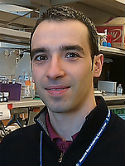Donor CD19 CAR T cells exert potent graft-versus-lymphoma activity with diminished graft-versus-host activity Journal Article
| Authors: | Ghosh, A.; Smith, M.; James, S. E.; Davila, M. L.; Velardi, E.; Argyropoulos, K. V.; Gunset, G.; Perna, F.; Kreines, F. M.; Levy, E. R.; Lieberman, S.; Jay, H. V.; Tuckett, A. Z.; Zakrzewski, J. L.; Tan, L.; Young, L. F.; Takvorian, K.; Dudakov, J. A.; Jenq, R. R.; Hanash, A. M.; Motta, A. C. F.; Murphy, G. F.; Liu, C.; Schietinger, A.; Sadelain, M.; Van Den Brink, M. R. M. |
| Article Title: | Donor CD19 CAR T cells exert potent graft-versus-lymphoma activity with diminished graft-versus-host activity |
| Abstract: | Allogeneic hematopoietic stem cell transplantation (allo-HSCT) is a potentially curative therapy for hematological malignancies. However, graft-versus-host disease (GVHD) and relapse after allo-HSCT remain major impediments to the success of allo-HSCT. Chimeric antigen receptors (CARs) direct tumor cell recognition of adoptively transferred T cells. CD19 is an attractive CAR target, which is expressed in most B cell malignancies, as well as in healthy B cells. Clinical trials using autologous CD19-targeted T cells have shown remarkable promise in various B cell malignancies. However, the use of allogeneic CAR T cells poses a concern in that it may increase risk of the occurrence of GVHD, although this has not been reported in selected patients infused with donor-derived CD19 CAR T cells after allo-HSCT. To understand the mechanism whereby allogeneic CD19 CAR T cells may mediate anti-lymphoma activity without causing a significant increase in the incidence of GVHD, we studied donor-derived CD19 CAR T cells in allo-HSCT and lymphoma models in mice. We demonstrate that alloreactive T cells expressing CD28-costimulated CD19 CARs experience enhanced stimulation, resulting in the progressive loss of both their effector function and proliferative potential, clonal deletion, and significantly decreased occurrence of GVHD. Concurrently, the other CAR T cells that were present in bulk donor T cell populations retained their anti-lymphoma activity in accordance with the requirement that both the T cell receptor (TCR) and CAR be engaged to accelerate T cell exhaustion. In contrast, first-generation and 4-1BB-costimulated CAR T cells increased the occurrence of GVHD. These findings could explain the reduced risk of GVHD occurring with cumulative TCR and CAR signaling. © 2017 Nature America, Inc., part of Springer Nature. All rights reserved. |
| Journal Title: | Nature Medicine |
| Volume: | 23 |
| Issue: | 2 |
| ISSN: | 1078-8956 |
| Publisher: | Nature Publishing Group |
| Date Published: | 2017-02-01 |
| Start Page: | 242 |
| End Page: | 249 |
| Language: | English |
| DOI: | 10.1038/nm.4258 |
| PROVIDER: | scopus |
| PUBMED: | 28067900 |
| PMCID: | PMC5528161 |
| DOI/URL: | |
| Notes: | Article -- Export Date: 2 March 2017 -- Source: Scopus |
Altmetric
Citation Impact
BMJ Impact Analytics
MSK Authors
Related MSK Work
























